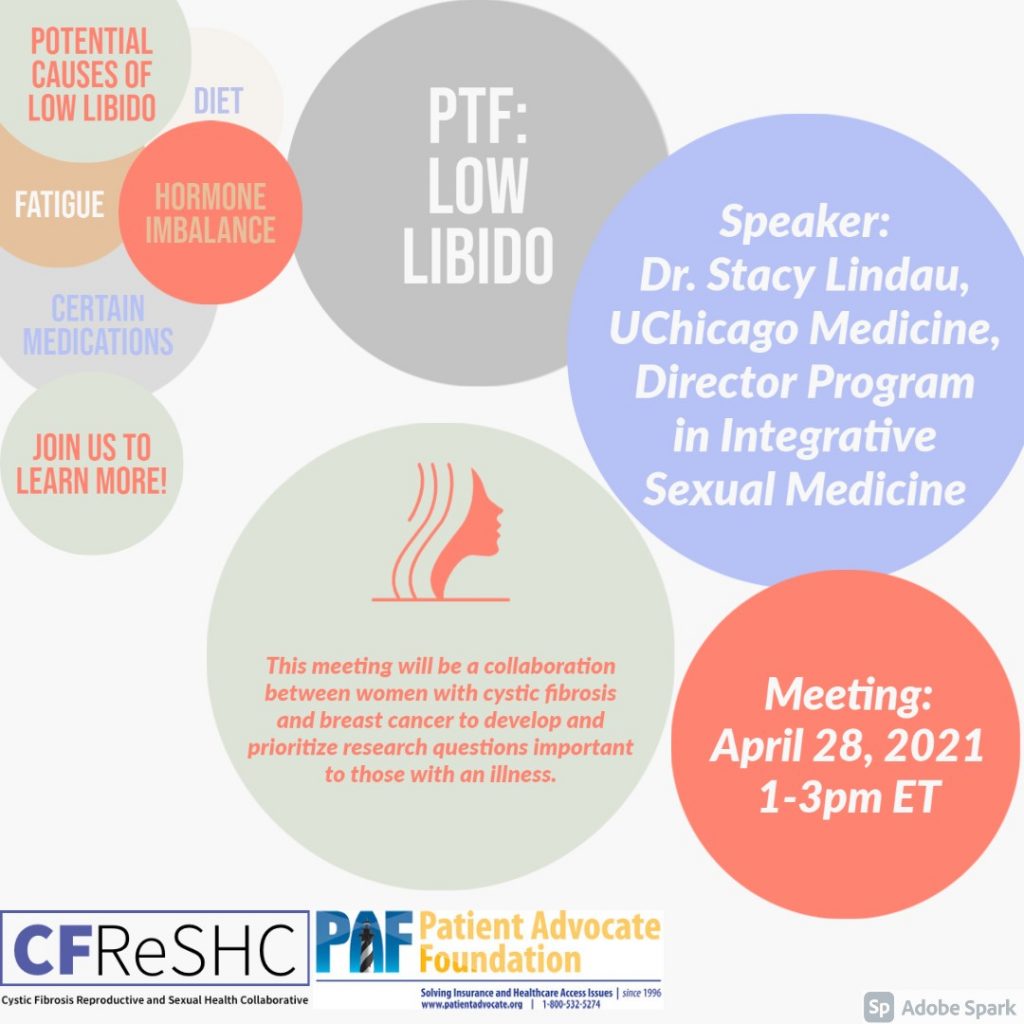
Registration is now open for our PTF Meeting about Low Libido, April 28, 2021 from 1:00-3:00 PM EDT.
This meeting will be a collaboration between women with cystic fibrosis and breast cancer to develop and prioritize research questions important to those with illness. Our guest speaker is Dr. Stacy Lindau, UChicago Medicine, Director of Program in Integrative Medicine. This meeting will be held via Zoom; register below in the form embedded at the bottom of this page or click here to open the registration link in a new window.
Living Low Libido by Jennifer Kyle
Libido is that sensation you feel when you are interested in sexual activity. But for many women, that desire fades or disappears. There are many reasons for low libido from physical to psychological. Medications, surgeries, fatigue, stress, and diet are all linked to low libido, as are hormonal changes due to menopause, pregnancy, and breastfeeding. Other contributing factors include mental health issues, stress, low self-esteem, a history of abuse and relationship issues. Yet, there is little focus on how low libido impacts a woman. A quick Google search on low libido in women will show you that more research is needed because, while it is documented that it occurs, treatment options are few. Instead, there are recommendations. Sex therapists and skilled counselors may help, but finding one in your area, much less one you can afford, and one you are comfortable discussing your sex life with may be challenging. If you are perimenopausal, you might speak to your gynecologist about new medications to help improve female sex drive. However, these medications are not FDA approved for post-menopausal women and I am six years post-menopausal.
While I do sometimes have an interest in sex, I must work hard to get my body to respond and then it is difficult to achieve an orgasm. Many days will pass and it will suddenly occur to me that I didn’t even think about or miss sex. I have pursued many options in my quest to restore my libido. I spent a year with a pelvic floor therapist to help loosen the tight muscles in and around the vagina. I tried vaginal suppositories and creams to increase estrogen because I was not in favor of the hormone replacement therapy often prescribed in menopause. I went to a sex counselor by myself and with my partner. I spent tons of money on a variety of over-the-counter supplements with disappointing results. I even tried to track any changes (diet, sleep, exercise) that might have a positive or negative effect on my libido, though I am not sure there is a pattern. Personally, I think the most important factor in handling a low libido is having a patient and understanding partner.
I know I am not alone in trying to improve low libido. As sexual beings, we are willing to try one or all of these things with the hope of getting that “I want sex!” feeling back. I sometimes wonder – do women fear relationships because they lack the desire to have sex or do women have sex to please their partner? Those are very sad questions to pose because my guess is that the answer to both is yes. So the big question is – how do we work with our low libido so we can have a fulfilling sex life? I plan to pose these questions to Dr. Stacy Lindau, Director of the Program in Integrative Sexual Medicine and Professor of Obstetrics and Gynecology and Medicine-Geriatrics, University of Chicago Medicine, when she presents at the April PTF meeting. I am excited to hear what she has to share with us. I still have hope that I can regain that urge to orgasm and have a fulfilling sex life.
